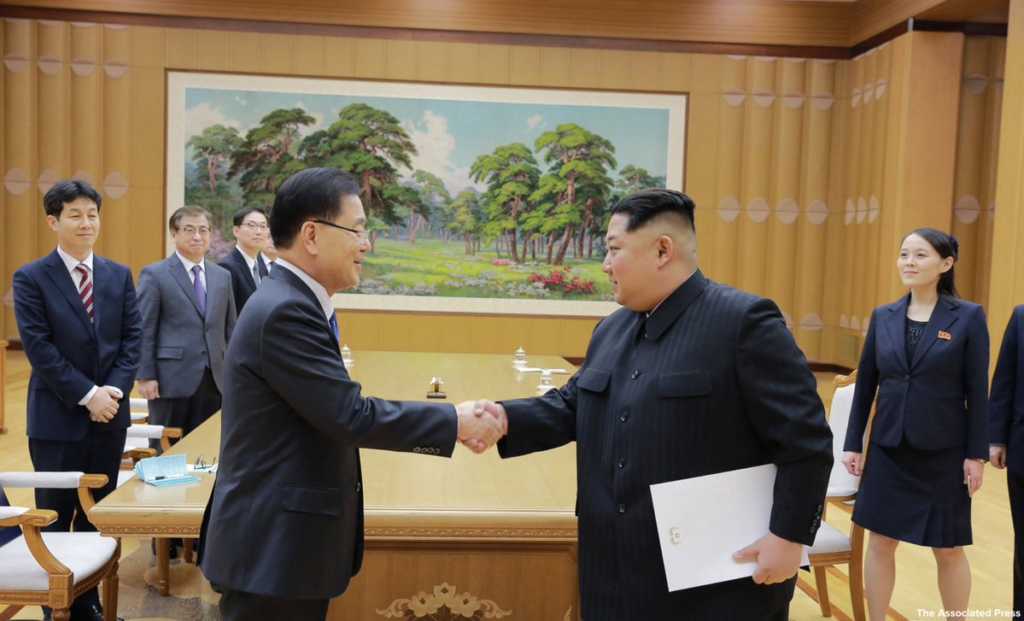In an astonishing move, North Korea’s supreme leader Kim Jong-un has stated his willingness to look into denuclearizing his regime. North Korea has become one of the most recognizable nuclear threats on the planet and has been sanctioned heavily by the United States and United Nations as a result.
Last August, President Trump tweeted about the latest sanctions package: “United Nations Resolution is the single largest economic sanctions package ever on North Korea,” he wrote in a Twitter message Saturday. “Over one billion dollars in cost to N.K.”
Despite simmering tensions between the North and the Republic of Korea (South Korea), the North Korean leader’s comments following some extremely rare diplomatic meetings between Jong-un and South Korea’s National Security Director Chung Eui-yong.
“The North side clearly affirmed its commitment to the denuclearization of the Korean Peninsula and said it would have no reason to possess nuclear weapons should the safety of its regime be guaranteed and military threats against North Korea removed,” Chung said in a statement, according to Yonhap News Agency.
The New York Times reported part of the statement to read that North Korea “would have no reason to keep nuclear weapons if the military threat to the North was eliminated and its security guaranteed.”
Chung further stated that the North Korean government was ready to have a “heart-to-heart” with the United States regarding denuclearization and cooling relations between the two nations. “It made it clear that while the dialogue is continuing, it will not attempt any strategic provocations, such as nuclear and ballistic missile tests,” the statement continued.
Chung also noted that North Korea made no unreasonable demands, but that there were some disclosed requests of the Trump administration that would be passed on. “They only said they wanted to be treated like a serious dialogue partner,” the national security director said of North Korea.
President Trump has been extraordinarily hard-line in his rhetoric toward the North Korean dictator, at times referring to him as “rocket man,” and promising “fire and fury” if the US ever felt threatened by the North Korean weapons arsenal.
Many Trump supporters have hailed this latest development as a resounding victory for the President and his tough-talking foreign policy. One of those is former UKIP leader and Brexit leader Nigel Farage.
This is a great victory for @POTUS. The threat of “fire and fury” has worked. https://t.co/DUsuI2WVR3
— Nigel Farage (@Nigel_Farage) March 6, 2018
It is an unprecedented diplomatic move from Pyongyang. Jong-un has previously refused to ever even consider giving up his quest for intercontinental nuclear weaponry.
At a major security conference in the Philipines last August, North Korean Foreign Minister Ri Yong Ho told delegates that his nation would never give up its nuclear weapons. “We will, under no circumstances, put the nukes and ballistic rockets” up for negotiation, he explained. A further statement reported by the state-run Korean Central News Agency added:
“There is no bigger mistake than the United States believing that its land is safe across the ocean.”
North Korea “will make the U.S. pay dearly for all the heinous crimes it commits against the state and people of this country,” the statement said. Now, it appears, a major diplomatic shift has taken place.
Last month, President Trump said that he could be open to negotiating with North Korea, but “only under the right conditions.”
Today, as the news broke of these latest talks between the North and South, Trump tweeted:
Possible progress being made in talks with North Korea. For the first time in many years, a serious effort is being made by all parties concerned. The World is watching and waiting! May be false hope, but the U.S. is ready to go hard in either direction!
— Donald J. Trump (@realDonaldTrump) March 6, 2018
Meanwhile, Japanese Defense Minister Itsunori Onodera, a long-time supporter of the Trump administration’s tough approach to Pyongyang, urged caution.
“While talking about nuclear abandonment several times, it turned out that North Korea didn’t halt its nuclear development in the past,” Mr. Onodera said, according to the New York Times. “We need to carefully assess if this North and South dialogue will really lead to the abandonment of nuclear and missile development.”
Former State Department Official J. R. Revere was also rather underwhelmed by the revelations. He told the New York Times that this formula of denuclearization for security guarantees had “been the basis of several sets of talks” between the two countries in years gone by.
“The U.S. has actually provided security guarantees to North Korea, including in writing by President Clinton,” Mr. Revere added. “Such guarantees have never been adequate or acceptable to the North Koreans, just as the U.S. provision of alternative energy sources, food and other assistance has never proved adequate.”
He did concede, however, that the latest developments swing the door wide open for direct US-North Korean talks. “With these developments, the door seems wide open to a U.S.-North Korea exploratory conversation if both sides want one,” he said.



